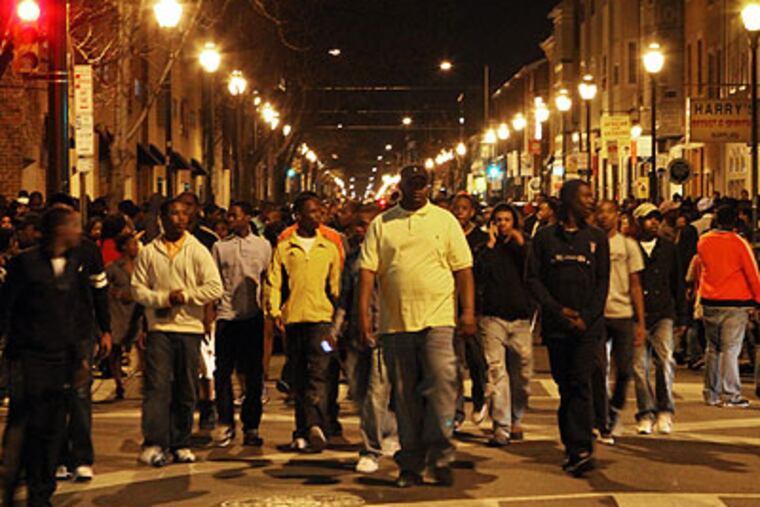Tackle the reasons for flash mobs
What's really behind the "flash mobs" in Philadelphia? Our mayor, speaking from the pulpit of his home church, called the youths involved "ignorant," "stupid," "butthead," pants-sagging byproducts of "sperm donors" and "human ATMs" wreaking havoc on innocent people in Center City.

By Kevin R. Johnson
What's really behind the "flash mobs" in Philadelphia?
Our mayor, speaking from the pulpit of his home church, called the youths involved "ignorant," "stupid," "butthead," pants-sagging byproducts of "sperm donors" and "human ATMs" wreaking havoc on innocent people in Center City.
The national media gleefully joined in, calling them "young hoodlums." Does CNN, MSNBC, Fox, or the larger community really distinguish between "good" black children and "bad" black children?
I'll be the first to admit that we cannot and should not tolerate violence in our beloved Philadelphia. But I also believe there is more to this story. It is easy to label, but very difficult to solve.
Observing the unrest of his day, Malcolm X said, "We are today seeing a global rebellion of the oppressed against the oppressor, the exploited against the exploiter."
From the streets of Philadelphia, to the streets of London, to Cairo's Tahrir Square, Hama in Syria, and Sidi Bouzid in Tunisia, there is a revolution erupting that is being led by the children of the digital age. Their outcry ranges from concern for political clout to governance, jobs, education, economic freedom, and simply being acknowledged as a valued human beings.
In the 1970s, we believed poet Gil Scott-Heron when he said, "The revolution will not be televised." Little did any of us know, however, that we would live in a world of social media in which Web-based and mobile technologies would be used to communicate and create interactive dialogues and social gatherings.
Ever since the summer of 2003, when Bill Wasik, a senior editor of Wired magazine, who happens to be white, first introduced the notion of a flash mob at Macy's department store in New York, young people have used Twitter, Facebook, YouTube, Digg, MySpace, and other media to demonstrate in commercial and public spaces that they have power, too.
What are the young people inGreat Britain, Egypt, Syria, Tunisia, and, yes, Philadelphia, saying that we are not hearing? Young people don't just magically appear en masse. What pain are they experiencing that we cannot see or feel?
"A riot is the language of the unheard," said Dr. Martin Luther King Jr. Hence, when we see young people rioting or in flash mobs, it is because they feel powerless and want to be heard. Those with a clear sense of hope and a bright future don't cause havoc simply because they have nothing better to do.
When all black children are lumped together with a few bad actors, the powers-that-be, especially the police, don't distinguish between them. Consequently, all black children are endangered and the potential is increased for stirring up the not-so-hidden racism in the City of Brotherly Love.
The violence that has ailed the black community for decades is symptomatic of the ills blacks contend with economically, educationally, politically, and socially. Some in the black community are victims of "terror" on a daily basis.
But, as it is with any other problem, as long as violence stays in the black community, the media, politicians, and authorities can ignore the systemic issues and treat us all alike. However, the moment the problem spreads into Center City, or is no longer contained within our communities, there is outrage.
This is not only problematic, but sickening. When we value the lives of those who live in Center City more than those who live in North, South, or West Philadelphia, we are sending a message that the lives of those who have been "kissed by nature's sun" don't matter. The issues plaguing our youths should have been addressed some time ago, and should be addressed by all of us.
Frederick Douglass warned that "Where justice is denied, where poverty is enforced, where ignorance prevails, and where any one class is made to feel that society is in an organized conspiracy to oppress, rob, and degrade them, neither persons nor property will be safe."
We can no longer ignore the cries of our children. They need more than tough talk, a few recreation centers, and inevitable profiling by the police. They need involved, loving parents, quality education, jobs, and mentors. They need community-focused churches, mosques, and synagogues. They need us. Only then will the flash mobs disperse.
As always, keep the faith, and let's stop talking, start listening, and begin solving the urban challenges of our great city. Young people, we hear you!